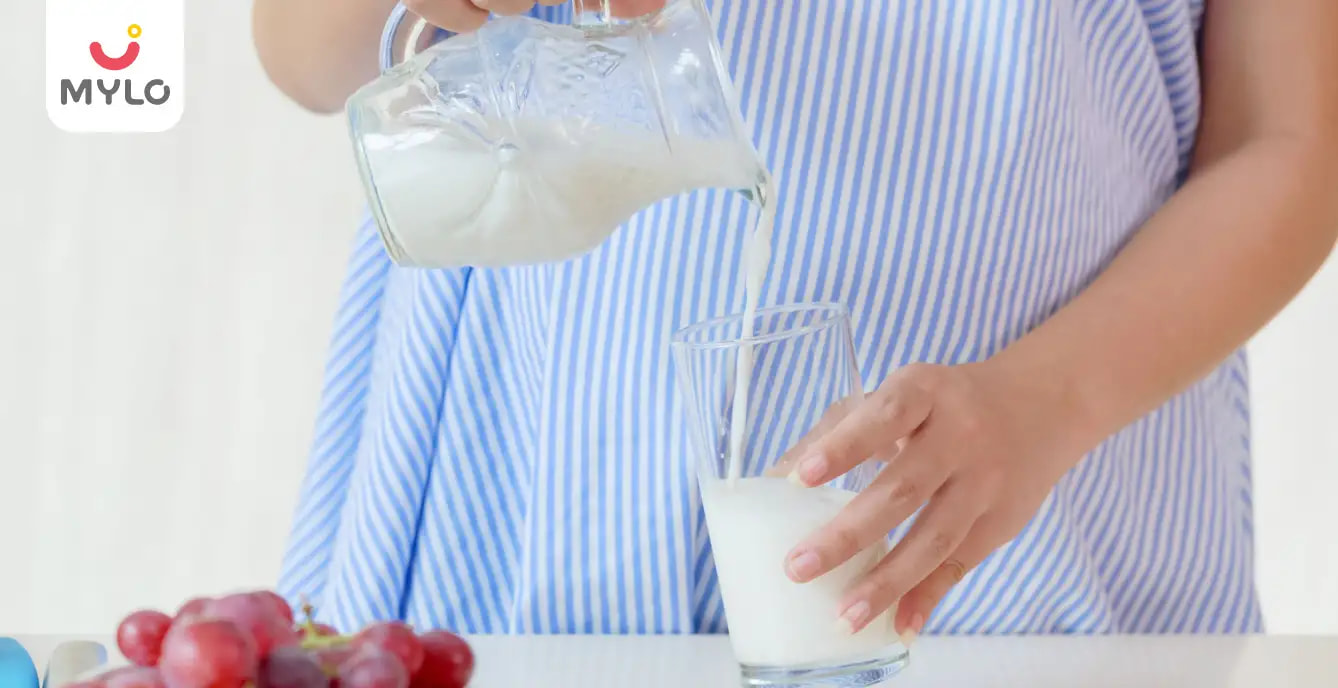Home

Diet & Nutrition

What To Eat During Pregnancy?
In this Article

Diet & Nutrition
What To Eat During Pregnancy?
Updated on 3 November 2023
Introduction
Food is undoubtedly one of the most vital things for survival. When it comes to your pregnancy, your diet becomes the most important thing to keep a check on. Knowing what to eat and what not to eat during pregnancy is crucial.
Two critical functions that your diet as an expecting mother must fulfill:
- It should nourish your body properly.
- It should help nurture and develop the embryo.
What are the essential foods to eat during pregnancy
-
Water
Before consuming water during pregnancy, boil it for at least 15–20 minutes to render it germ-free.
-
Milk
It helps in providing a solid foundation for the bones of the fetus. Take a cup of milk daily in the morning and evening throughout pregnancy. It facilitates the baby's proper physical, mental, and intellectual development.
-
Butter, buttermilk, and ghee
Fresh butter has a cooling effect; increases vitality, energy, and enthusiasm; and improves your skin complexion and digestive health.
Many women face water retention during the last trimester of pregnancy. Buttermilk helps reduce bloating.
Ghee provides strength to the sensory organs and increases memory retention. Regular consumption of ghee is said to increase the baby's intelligence.
-
Food items containing calcium and iron
A lack of iron can cause incomplete embryo development, leading to several complications during childbirth.
A few drops of lemon juice sprinkled on leafy vegetables provide a good dose of vitamin C, which is essential for the optimal absorption of iron. Black raisins, dates, beetroot, pomegranate, apples, and saffron also help boost iron content. Jaggery, wheat, easily digestible pulses (such as mung beans and yellow gram, sometimes with their husks), coconut, dry dates, and poppy seeds are good sources of natural iron.
-
Cereals, pulses, and legumes
Lunch and dinner should include at least one cup of plain cooked pulses and one cup of spiced pulses. Yellow gram and green gram are exceptions for daily consumption. The entire development of the fetus is dependent on protein. Sprouts of the lighter pulses like mung should be included in the diet at least once a day, preferably with the midday meal. Steam or cook them before eating.
-
Grains
Pulses become easier to digest when consumed with rice or other cooked grains. Grains should be roasted before grinding, making them easy to digest.
-
Honey
Consume one to two teaspoons of honey daily. It improves intelligence and lends a glow to your complexion. It is beneficial for the eyes and helps purify the blood.
You may also like: 10 Benefits of Dalia During Pregnancy
What vegetables to eat during pregnancy
The following vegetables are easily digestible and suitable for most women:
- Bottle gourd
- Ridge gourd
- Smooth gourd
- Ash gourd
- Ladyfinger
- Red pumpkin
- Potatoes
- Bitter gourd
- Gherkins
- Leafy vegetables, such as spinach
Cucumber, tomatoes, carrots, and beetroots can also be consumed daily in small quantities as a salad.
During the monsoon, water tends to contain a lot of impurities, increasing the risk of bacterial and microbial contamination in vegetables. So, consume leafy vegetables during the monsoon with caution.
What fruits to eat during pregnancy
- Eat at least one seasonal fruit – such as grapes, apples, pomegranates, and oranges – daily during your pregnancy.
- Since it is common for amniotic fluid to suddenly decrease during the seventh or eighth month of pregnancy, fresh coconut water is a healthy drink for this time.
- Sour fruits such as pineapple, strawberry, wood apple, custard apple, guava, pear, and watermelon should be consumed occasionally.
- Dry fruits – especially almonds – are a must for expecting women. It nourishes the brain of the developing fetus.
- Chew and eat one dry date every day. Alternatively, consume a teaspoon of dried date powder with a glass of milk daily.
- Consume apricots to provide nourishment to the growing baby. Occasionally consume walnuts, cashew nuts, and pistachios.
What not to eat during pregnancy
- Try to avoid both ripe and green mangoes.
- Avoid consuming non-seasonal fruits.
- Papayas are known to cause uterine contractions and can even induce miscarriage. Hence, these should never be eaten by pregnant women.
- Reduce excessive intake of fruit salads and milkshakes.
- Vegetables such as sweet potatoes and mushrooms are difficult to digest. Capsicum, eggplant, spring onions, and cluster beans should also be eaten rarely.
- Carrot or tomato juice is not advisable. You can consume tomato soup occasionally.
What to eat after vomiting during pregnancy
Consume a small amount of plain food with very little smell at cold or room temperature. You can have white bread toast, mashed potatoes, fruits, white rice, plain hot cereal, and plain white pasta.
What to eat for low blood pressure during pregnancy
Eat fruits and vegetables rich in minerals and vitamins. Don't eat heavy meals at a time. Reduce it to a shorter meal at regular intervals.
What to eat during the first and second trimesters of pregnancy?
There are subtle differences between what you must eat during the first trimester of pregnancy and what to eat during the second trimester of pregnancy. Here is a list of the essentials:
- First trimester: Consume folate-rich foods, vitamin B6, fruits discussed above, milk products, and iron-rich foods.
-
Second trimester: You should consume iron, vitamin C, protein-rich foods, calcium, folate, vitamin D, and Omega-3 fatty acids. Also, increase your fluid intake.
Conclusion
Your baby will go through changes throughout the nine months in the womb. Knowing what to eat during pregnancy and having a healthy diet is always the best thing you can do for your baby’s proper development. Iron, folate-rich foods, milk products like buttermilk, butter, and ghee, dry fruits, and seasonal fruits are essential for your health and your baby’s development. Ensure you keep a list of the foods to retain and eliminate from your diet handy during this time.
Resources
1. Kominiarek MA, Rajan P. (2016). Nutrition Recommendations in Pregnancy and Lactation. Med Clin North. NCBI
2. EatforHealth Team. What are the Australian dietary guidelines?. eatforhealth.gov.au
Popular Articles
Trending Articles



Written by
Mittali Khurana
Mittali is a content writer by profession. She is a dynamic writer with 04+ years of experience in content writing for E-commerce, Parenting App & Websites, SEO.
Read MoreGet baby's diet chart, and growth tips

Related Articles
RECENTLY PUBLISHED ARTICLES
our most recent articles

Diet & Nutrition
গর্ভাবস্থায় আলুবোখরা: উপকারিতা ও ঝুঁকি | Prunes During Pregnancy: Benefits & Risks in Bengali

Diet & Nutrition
গর্ভাবস্থায় হিং | ঝুঁকি, সুবিধা এবং অন্যান্য চিকিৎসা | Hing During Pregnancy | Risks, Benefits & Other Treatments in Bengali

Women Specific Issues
স্তনের উপর সাদা দাগ: লক্ষণ, কারণ এবং চিকিৎসা | White Spots on Nipple: Causes, Symptoms, and Treatments in Bengali

Diet & Nutrition
গর্ভাবস্থায় পোহা: উপকারিতা, ধরণ এবং রেসিপি | Poha During Pregnancy: Benefits, Types & Recipes in Bengali

Diet & Nutrition
গর্ভাবস্থায় মাছ: উপকারিতা এবং ঝুঁকি | Fish In Pregnancy: Benefits and Risks in Bengali

Diet & Nutrition
গর্ভাবস্থায় রেড ওয়াইন: পার্শ্ব প্রতিক্রিয়া এবং নির্দেশিকা | Red Wine During Pregnancy: Side Effects & Guidelines in Bengali
- ইনার থাই চ্যাফিং: কারণ, উপসর্গ এবং চিকিৎসা | Inner Thigh Chafing: Causes, Symptoms & Treatment in Bengali
- গর্ভাবস্থায় ব্রাউন রাইস: উপকারিতা ও সতর্কতা | Brown Rice During Pregnancy: Benefits & Precautions in Bengali
- Velamentous Cord Insertion - Precautions, Results & Safety
- Unlock the Secret to Flawless Skin: 7 Must-Have Qualities in a Face Serum
- Unlock the Secret to Radiant Skin: How Vitamin C Serum Can Transform Your Complexion
- Gender No Bar: 10 Reasons Why Everyone Needs a Body Lotion
- Unlock the Secret to Radiant Skin How to Choose the Perfect Body Lotion for Your Skin Type
- Top 10 Reasons to Apply a Body Lotion After Every Bath
- Communication in Toddlers: Milestones & Activities
- How to Improve Vocabulary for Toddlers?
- A Comprehensive Guide to Understanding Placenta Accreta
- Vulvovaginitis in Toddlers Causes, Symptoms and Treatment
- A Comprehensive Guide to Understanding Cerebral Palsy in Children
- Bitter Taste in Mouth During Pregnancy: Understanding the Causes and Remedies


AWARDS AND RECOGNITION

Mylo wins Forbes D2C Disruptor award

Mylo wins The Economic Times Promising Brands 2022
AS SEEN IN

- Mylo Care: Effective and science-backed personal care and wellness solutions for a joyful you.
- Mylo Baby: Science-backed, gentle and effective personal care & hygiene range for your little one.
- Mylo Community: Trusted and empathetic community of 10mn+ parents and experts.
Product Categories
baby carrier | baby soap | baby wipes | stretch marks cream | baby cream | baby shampoo | baby massage oil | baby hair oil | stretch marks oil | baby body wash | baby powder | baby lotion | diaper rash cream | newborn diapers | teether | baby kajal | baby diapers | cloth diapers |








